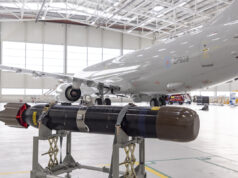New research by a geopolitical think-tank makes the case that Britain is second only to the United States as a global power.
According to the Henry Jackson Society, their new report ‘Towards a Global Britain: Challenging the new narratives of national decline’Â sets out why the UK has strengths across a range of areas that will empower it in the years ahead, including in its economy, military and culture.
The report builds on the findings from ‘An Audit of Geopolitical Capability’, also released today, which shows the U.K. was second only to the United States in geopolitical power.
Sir Malcolm Rifkind, the former Foreign Secretary, commenting on the study, said:
“The Global Britain Programme at The Henry Jackson Society shows with its inaugural report – ‘An Audit of Geopolitical Capability’ – that Britain is a cultural superpower, second only to the United States in its ability to propel liberal and democratic values around the world.â€
Dr. Alan Mendoza, Executive Director of The Henry Jackson Society, said:
“There is endless talk about Britain being ‘finished’ as a major power as a consequence of Brexit. In fact, we remain the second most powerful country in the world across a basket of indicators. We now need a Global Britain strategy to accompany this reality, providing the springboard for future national success into the Brexit era.†Â
The author of the report and Director of the Global Britain Programme at The Henry Jackson Society, James Rogers, said:
“Declinist narratives are never productive. They sap at any nation’s confidence and wellbeing. Irrespective of one’s stance in relation to ‘Leaving’ or ‘Remaining’ inside the European Union, we need at this moment concrete suggestions and proposals that seek to empower the United Kingdom as it accelerates its withdrawal.
At the broadest strategic level, this is what our latest report tries to do. It explains how declinists have often been wrong before; it explains Britain’s unique national geopolitical strengths; and it proposes solution to capitalise on those strengths.â€
Last year, we reported that researchers at European Geostrategy broke global powers down into four categories: Super Power, Global Power, Regional Power and Local Power.
The United States took the top slot as the world’s super power, while Britain took the only Global Power slot, bringing her in second behind America.
Regional powers include France, India and Germany, while local powers were those such as Italy, Brazil, and Turkey.
The organisation European Geostrategy rate the United Kingdom as a global power, they define this as:
“A country lacking the heft or comprehensive attributes of a superpower, but still with a wide international footprint and [military] means to reach most geopolitical theatres, particularly the Middle East, South-East Asia, East Asia, Africa and South America.”
 The British Armed Forces comprise the Royal Navy, a blue-water navy with a comprehensive and advanced fleet; the Royal Marines, a highly specialised amphibious light infantry force; the British Army, the UK’s principal land warfare force; and the Royal Air Force, with a diverse operational fleet consisting of modern fixed-wing and rotary aircraft.
The British Armed Forces comprise the Royal Navy, a blue-water navy with a comprehensive and advanced fleet; the Royal Marines, a highly specialised amphibious light infantry force; the British Army, the UK’s principal land warfare force; and the Royal Air Force, with a diverse operational fleet consisting of modern fixed-wing and rotary aircraft.
The country is a major participant in NATO and other coalition operations and is also party to the Five Power Defence Arrangements. Recent operations have included Afghanistan and Iraq, peacekeeping operations in the Balkans and Cyprus, intervention in Libya and again operations over Iraq and Syria.
Overseas defence facilities are maintained at Ascension Island, Belize, Brunei, Canada, Diego Garcia, the Falkland Islands, Gibraltar, Kenya, Bahrain and Cyprus.
The UK still retains considerable economic, cultural, military, scientific and political influence internationally. It’s a recognised nuclear weapons state and its defence budget ranks fifth or sixth in the world. The country has been a permanent member of the United Nations Security Council since its inception.
The United Kingdom also scores highly in the Chinese ranking system called ‘Comprehensive National Power’, this is a putative measure, important in the contemporary political thought of the People’s Republic of China, of the general power of a nation-state.
The key in this matter is that while countries like China for example have a larger military than the United Kingdom, it does not have the logistical capability to deploy, support and sustain those forces overseas in large numbers.
Professor Malcolm Chalmers, director of UK Defence Policy Studies at the renowned Royal United Services Institute, says Britain would have a clear advantage in a straight fight at an equidistant location. This was described in a 2011 Briefing Paper:
“The UK will never again be a member of the select club of global superpowers. Indeed it has not been one for decades. But currently planned levels of defence spending should be enough for it to maintain its position as one of the world’s five second-rank military powers (with only the US in the first rank), as well as being (with France) one of NATO-Europe’s two leading military powers. Its edge – not least its qualitative edge – in relation to rising Asian powers seems set to erode, but will remain significant well into the 2020’s, and possibly beyond.â€
According to Business Insider, Chalmers has since expanded on this:
“I think my 2011 comment remains valid. If you take individual elements of front line military capability – air, sea, land — the UK armed forces continue to outmatch those of China in qualitative terms by some margin. The UK also has greater capabilities for getting the most out of these forces, through key enabling capabilities (command and control, intelligence, strategic transport).
Not least, the UK has greater capability than China for operating at range. China (and even more so other Asian powers) remain focused on their immediate neighbourhoods, with limited capabilities for power projection. This is likely to change over the next decade. For now, though, China would still be out-matched qualitatively in a ‘straight fight’ with the UK in an equidistant location (the south Atlantic? The Gulf?), and would be unable to mobilise a force big enough to outweigh this quality gap. China’s quantitative advantages would come into play in the event of a conflict in its own neighbourhood – and its qualitative weaknesses would be less important, though still significant. So my statement was never meant to imply that the UK could outmatch China off the latter’s own coastline.â€
Read more about that here. To read the full report click here. To download ‘The Geography of British Power’ map, click here.













Ah, but numbers inevitably count during a protracted campaign, be it hardware or boots on the ground.
Fallon and successive defence ministers have made the same mistakes as their predecessors, and taken for granted what they once had!!! We are a very professional military but far too small.
Surprised China isn’t no 2. But it soon will be. On pure identifiable military power we’re nowhere near China, Russia, India or even South Korea.
What a load of drivelling brexit nonsense. The extent of the absolute rambling insanity coming from that camp, in forms like this, is getting dangerous and very worrying. There is clearly a serious mental health issue going unaddressed.
Delusional
I’d like to comment but I can’t stop laughing!
Is it April 1st or has he not taken his medication?
This is interesting but neglects mentioning that the regional power of Canada, Australia and add in New Zealand can be seen to be part of the British global resource.
We are super power, Great Britain +Royal Canada, Australia, New Zealand and South Africa.
The only country in Europe to have two giant aircraft carriers built entirely in the UK, the ability to produce in house some of the largest and best submarines in the world, a very large satellite industry, our banking sector is amongst the top two in the world. Our ability to project power around the globe is only second in the world. We are also the only country in Europe that can afford to go it alone to build a 6gen fighter aircraft. We are starting to build back our industrial strength and we are predicted to overtake the German economy by 2028. This will be due to aging population of Germany, they just don’t have enough children and young adults, this is already effecting their economy and within 7 years the average age of their working population will be the late 60’s. The UK has the commonwealth, with one country in that is India, which has a giant military strength, along with our other commonwealth friends Canada, Australia and New Zealand which we share common values and language. In Entertainment we have a huge movie and TV industry so I think people who put this country down should think long and hard about how lucky they are to be living in such a great country with a fantastic NHS. Aside the rain I think this country is the best place in the world.
You forgot to mention UK’s Nuclear Power.
Surely the attitude of those in power towards casualties whether political or human has to play apart in assessing power. China is so economically powerful why would they care? They have almost infinite collateral. Just like the USA and the UK before, they will eventually be the Super power.
If you have seen what is happening in the war between Russia and Ukraine; a major weakness of some powers is corruption. They are great powers on paper only and are exposed when they go to war. The Chinese military is one of the most corrupt in the world.